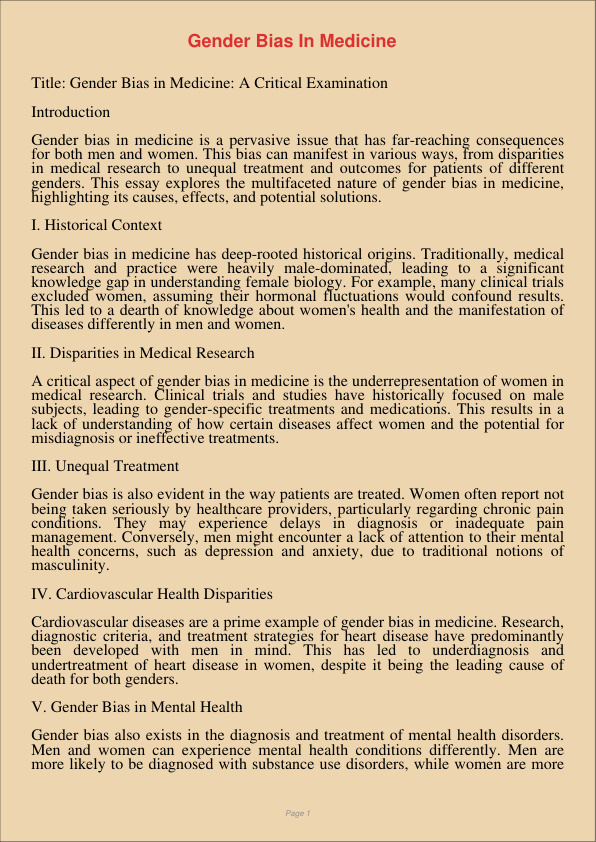Gender Bias In Medicine
Jan 12, 2024
gender bias
medicine
Psychology
Finance & Accounting
Title: Gender Bias in Medicine: A Critical Examination
Introduction
Gender bias in medicine is a pervasive issue that has far-reaching consequences for both men and women. This bias can manifest in various ways, from disparities in medical research to unequal treatment and outcomes for patients of different genders. This essay explores the multifaceted nature of gender bias in medicine, highlighting its causes, effects, and potential solutions.
I. Historical Context
Gender bias in medicine has deep-rooted historical origins. Traditionally, medical research and practice were heavily male-dominated, leading to a significant knowledge gap in understanding female biology. For example, many clinical trials excluded women, assuming their hormonal fluctuations would confound results. This led to a dearth of knowledge about women’s health and the manifestation of diseases differently in men and women.
II. Disparities in Medical Research
A critical aspect of gender bias in medicine is the underrepresentation of women in medical research. Clinical trials and studies have historically focused on male subjects, leading to gender-specific treatments and medications. This results in a lack of understanding of how certain diseases affect women and the potential for misdiagnosis or ineffective treatments.
III. Unequal Treatment
Gender bias is also evident in the way patients are treated. Women often report not being taken seriously by healthcare providers, particularly regarding chronic pain conditions. They may experience delays in diagnosis or inadequate pain management. Conversely, men might encounter a lack of attention to their mental health concerns, such as depression and anxiety, due to traditional notions of masculinity.
IV. Cardiovascular Health Disparities
Cardiovascular diseases are a prime example of gender bias in medicine. Research, diagnostic criteria, and treatment strategies for heart disease have predominantly been developed with men in mind. This has led to underdiagnosis and undertreatment of heart disease in women, despite it being the leading cause of death for both genders.
V. Gender Bias in Mental Health
Gender bias also exists in the diagnosis and treatment of mental health disorders. Men and women can experience mental health conditions differently. Men are more likely to be diagnosed with substance use disorders, while women are more likely to be diagnosed with mood and anxiety disorders. These differences can lead to unequal treatment approaches and potentially worsen outcomes.
VI. Intersectionality and Vulnerable Populations
Gender bias in medicine is compounded when considering intersectionality, where gender bias intersects with other factors such as race, socioeconomic status, and sexual orientation. Vulnerable populations, like LGBTQ+ individuals and people of color, may face even more significant disparities in healthcare, making it crucial to address this issue comprehensively.
VII. Addressing Gender Bias in Medicine
Addressing gender bias in medicine requires a multifaceted approach:
Diverse Representation: Increasing diversity in medical research and clinical trials is essential to develop treatments and medications that account for gender differences.
Education and Training: Healthcare providers should receive training in gender-sensitive care to ensure that patients receive equitable and effective treatment.
Awareness and Advocacy: Raising awareness about gender bias and advocating for gender-inclusive research and medical practices is crucial.
Policy Changes: Implementing policies and guidelines that mandate the inclusion of diverse populations in medical research and clinical trials can be an effective way to combat gender bias.
Research: More research should be conducted to understand gender differences in disease presentation and treatment responses, leading to better-informed healthcare decisions.
Conclusion
Gender bias in medicine is a pervasive issue that affects both men and women. It has deep historical roots, leading to disparities in medical research, unequal treatment, and adverse health outcomes. To address this issue, it is essential to promote gender-inclusive research, raise awareness, and advocate for policy changes to ensure that everyone receives equitable and effective healthcare, regardless of their gender. By acknowledging and actively addressing gender bias in medicine, we can take significant steps toward a more equitable and just healthcare system.
